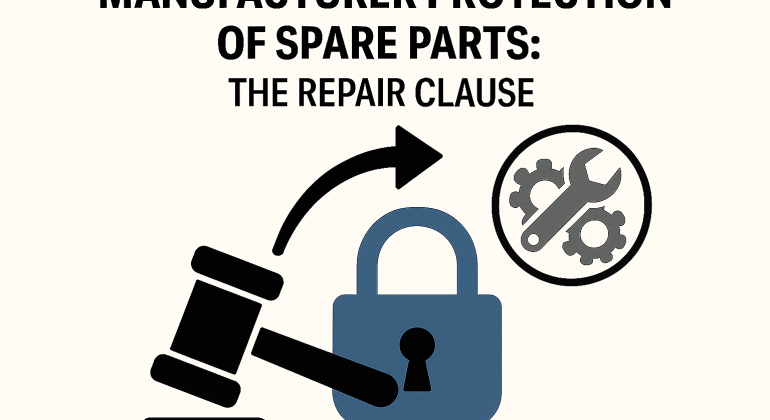Sommaire
Overview and legal framework
Spare parts
Spare parts are components that replace or restore the appearance of complex products, such as vehicles, electronic devices, or household appliances.
Evolution of legislation
Under the Climate and Resilience Act No. 2021-1104 of August 22, 2021, whose provisions came into force on January 1, 2023, certain articles of the French Intellectual Property Code have been amended:
- Article L.513-6, 4°, of the French Intellectual Property Code : this article now specifies that the rights conferred by the registration of a design cannot be invoked against acts aimed at restoring the original appearance of a motor vehicle or trailer, when such acts concern glazing-related parts or are carried out by the equipment manufacturer who manufactured the original part.
- Article L.122-5, 12°, of the French Intellectual Property Code : this article provides, in particular, that once a work has been disclosed, the author may not prohibit the reproduction, use, or marketing of parts intended to restore the original appearance of a motor vehicle or trailer.
These articles enable the creation of a repair clause that exempts “essential spare parts” from design and copyright protection in order to promote competition and support the objectives of the circular economy.
As a result, independent suppliers are allowed to manufacture and sell spare parts (such as headlights, rearview mirrors, and bumpers) without infringing on registered designs, provided that no logos or protected signs remain affixed.
For further information on the legal framework applicable to spare parts, we invite you to consult our previously published article
Application of the repair clause
The facts and procedure
In a decision dated June 11, 2025 (n°23-83.474), the Criminal Division of the Court of Cassation handed down a major decision clarifying the temporal application of the repair clause.
In this case, a subsidiary of a Spanish group specialized in the manufacture of original equipment for three French car manufacturers, resold rearview mirrors produced by this group without authorization. The car manufacturers then sued the company, which was found guilty of infringing designs, copyright, and trademarks by the criminal court. The Court of Appeal acquitted the defendants on the following grounds:
- Regarding the infringement of design rights, the judges applied Article L. 513-6, 4°, of the Intellectual Property Code as amended by the aforementioned law of August 22, 2021.
- Regarding the infringement of copyright, the judges applied Article L. 122-5, 12°, of the Intellectual Property Code, as amended by the aforementioned law of August 22, 2021.
- Regarding trademark infringement, the judges specified that the Spanish group itself had removed the reference to the trademarks or logos of the French car manufacturers from the rearview mirrors.
Retroactivity of the repair clause
Application of the more lenient criminal law
The Court of Appeal noted that the Climate and Resilience Act of August 22, 2021, , constitutes a criminal law when it has the effect of modifying the constituent elements of the infringement.
In this decision, the judges applied the provisions of the Climate and Resilience Act of August 22, 2021, even though the events took place before it came into force (scheduled for January 1, 2023). The judges then specified that Articles L. 513-6, 4° and L. 122-5, 12° of the Intellectual Property Code reduced the scope of the offense charged against the manufacturer of spare parts, which constitutes a more lenient criminal law that can be applied immediately in accordance with the principle laid down in Article 112-1, paragraph 3, of the French Criminal Code.
The legitimacy of retroactive application of the repair clause
The judges specified that this retroactivity is not contrary to the protection of property rights, guaranteed by Article 1 of the First Additional Protocol to the European Convention on Human Rights and Article 17 of the Universal Declaration of Human Rights. Indeed, the amendments made by the aforementioned law of August 22, 2021, constitute a proportionate infringement of the legitimate aim pursued, as demonstrated by the parliamentary proceedings, which sought through this law to open up the market for visible spare parts to competition.
Furthermore, the judges legitimately considered that these provisions were applicable not only to the original equipment manufacturer, i.e., the Spanish group, but also to the commercial chain linking the latter to the consumer, and in particular the subsidiary being prosecuted, without disregarding the principle of strict interpretation of criminal law.
Conclusion
This decision therefore provides further clarification on the repair clause:
- The repair clause may be applied retroactively and may apply to acts committed before January 1, 2023
- The repair clause applies to the entire commercial chain linking the original equipment manufacturer to the consumer
Dreyfus & Associés assists its clients in managing complex intellectual property cases, offering personalized advice and comprehensive operational support for the complete protection of intellectual property.
Nathalie Dreyfus with the support of the entire Dreyfus team
FAQ
1. Does the repair clause only apply to motor vehicles, or can it be extended to other sectors (household appliances, electronics, etc.) ?
Currently, the repair clause provided for in the Intellectual Property Code only applies to motor vehicles and trailers. An extension to other sectors is not ruled out, but it would require specific legislative or regulatory reform.
2. Does the repair clause exist in other European countries?
Yes, several EU Member States, such as Germany, already have similar exceptions for visible parts, and harmonization is planned under European law to ensure the free movement of spare parts.
3. What must companies do to comply ?
They must verify that distinctive signs have been removed, ensure that the parts concerned fall within the scope of the exception, and adapt their contracts and internal procedures to this new regulation.
4. Does the repair clause only benefit independent suppliers ?
No. It benefits all operators, including original equipment manufacturers and the entire commercial chain, provided that the legal conditions are met.
5. What are the advantages for consumers ?
The repair clause promotes competition, reduces the cost of visible spare parts, stimulates the circular economy, and broadens the range of spare parts available on the market.


